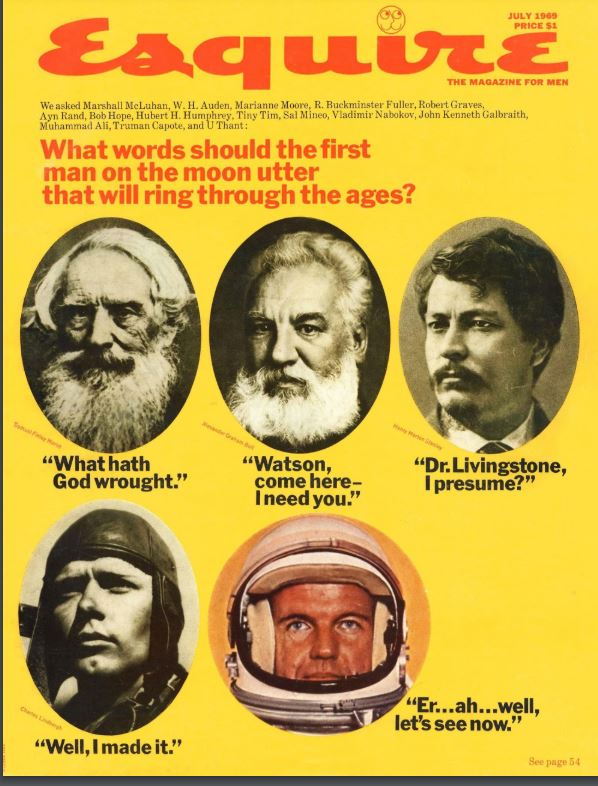In anticipation of Neil Armstrong’s moon landing on July 20, 1969, Esquire magazine for that month asked a group of luminaries led off by Marshall McLuhan, and featuring Tiny Tim, Sal Mineo and Mohammad Ali, “what words should the first man on the moon utter that will ring through the ages?”
McLuhan offered two suggestions. Both were from Finnegans Wake but their source was not identified.
l) The thickest mud that was ever heard dumped. (FW 296)
2) Spitz on the iern while it’s hot. (FW 207)
The first quotation was somewhat mangled from Joyce’s “the muddest thick that was ever heard dump”.
What did McLuhan have in mind with his suggestions?
The second seems to have been a comment on the occasion of Esquire‘s question and feature article about it (‘Le Mot Juste for the Moon‘ by William H Honan).1 Perhaps he was playing up the extreme contrast between Esquire‘s hope to capture the public’s momentary interest and “words that will ring through the ages”: Spitz on the iern while it’s hot. ‘Spitz’ (German ‘spike’ or ‘summit’) as the acme of interest in this story to be captured before the next big (Spitz) story in the next issue of Esquire. ‘Spits’ as the quality of thought being given to the event, as well as the vaporous-vacuous result of its meeting with the hot iron of public opinion. (The hot iron of Irish public opinion = iern.)
The first must have been intended as a comment both on what Armstrong would have to say (again as Spitz on the iern while it’s hot) and on Esquire‘s speculation about it: The thickest mud that was ever heard dumped — aka, pure bullshit.2
- Pages 53-55 and 138. McLuhan’s suggestions appear on 138. McLuhan’s name was played up on the Esquire cover and his comments played down, buried, in the article. Esquire obviously had no idea at all what McLuhan had in mind with his suggestions. On his side, McLuhan seems to have thought: OK, you want something to help your circulation, try chewing on this for a while. ↩
- McLuhan began his career with a deep faith in language as defining human being and, in particular, the Christian tradition. What he saw in his lifetime was that language had become the thickest mud that was ever heard dumped. ↩
